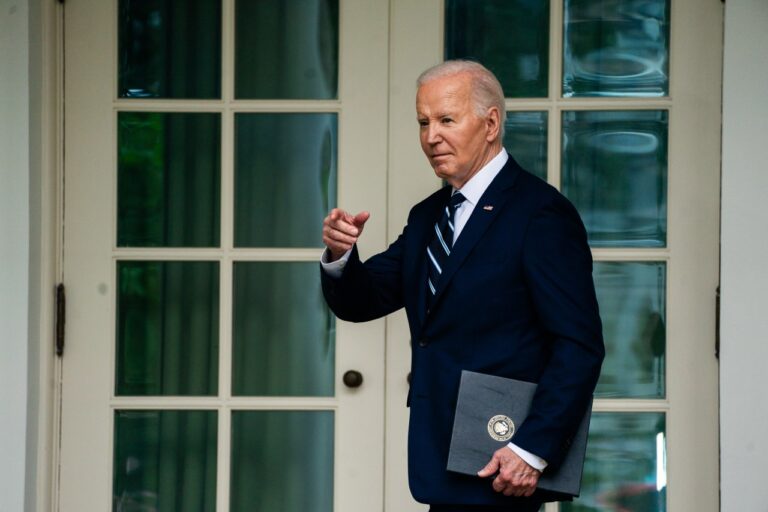President Biden announced on Tuesday that the United States would increase tariffs on Chinese-made electric vehicles (EVs) from 25% to 100%, as well as tariffs on semiconductors, solar panels and batteries. The move targets China’s “three new things” strategy, which relies on EVs, lithium batteries and solar panels to replace the struggling real estate sector and boost the economy.
The timing and strategic importance of these tariffs is critical. To effectively address U.S.-China relations, the United States needs to move from a reactive to a proactive approach, creatively leveraging its strengths.
China’s comprehensive strategy ranges from Taiwan to global competition with the United States While Beijing is proactive, the United States is often reactive, primarily focused on de-escalation. Recent examples include responses to conflicts in Ukraine, Israel, and the Taiwan Strait.
During a recent visit to Beijing, Secretary of State Antony Blinken warned China about supplying critical components for weapons production to Russia and said the United States would take action if China did not stop. This message highlights the challenges for the United States in responding to Chinese provocations, as the Chinese Communist Party (CCP) often avoids significant retaliation by adjusting its actions.
For example, China has refrained from directly providing arms to Russia to avoid a strong diplomatic or military response. Xi Jinping has promised to curb civil-military exports to Russia, but it is doubtful whether this will be implemented in good faith. China is good at finding loopholes. Beijing views Russia’s support in the Russia-Ukraine conflict as a way to drain U.S. resources and divert attention from the Taiwan Strait.
In the Taiwan Strait, China has gradually expanded its maritime patrols and military airspace violations, and is steadily asserting its dominance. The United States has been largely reactive and reluctant to escalate tensions into direct confrontation, which will not effectively deter Beijing.
The Chinese government aims to annex Taiwan without an open conflict, but it also has contingency plans in place. Over the past two years, China has strengthened ties with allies in the Global South, secured oil and gas reserves from Russia, and amassed gold to strengthen its economy against potential Western sanctions. China’s foreign exchange reserves amount to $3.22 trillion, the highest of any country.
In recent Congressional testimony, Director of National Intelligence Avril Haines referred to the first joint military exercises between China and Russia related to Taiwan. This cooperation is likely aimed at deterring the United States, as it is difficult to engage two nuclear powers at the same time.
The Chinese government recognizes the US dilemma. On the other hand, de-escalation is considered weak and may invite further attacks. On the other hand, the United States cannot act as the world’s police force, engaging in multiple conflicts at once.
Former Assistant Secretary of Defense Bridge Colby said the United States could struggle to fight one war, let alone multiple wars. The United States must choose between Taiwan, Israel, and Ukraine if necessary, but it cannot afford to collapse Ukraine because it might embolden Xi Jinping regarding Taiwan.
Traditional diplomatic and military means do not offer good options for the United States; instead, the United States should leverage its strengths to target the opponent’s weaknesses, disrupting the balance of power and forcing a change in strategy.
The United States’ biggest advantage over China is economics. While the US economy is strong, China’s domestic demand is weak, with consumption and investment kept to a minimum. The only bright spot for the Chinese economy is the “three new developments” led by EV exports. These exports contribute more to GDP growth than real estate, and China needs to maintain this momentum.
China also needs capital investment from abroad, as domestic confidence is low and much state-issued money remains sitting in banks. Foreign investment not only provides financial capital but also boosts confidence in the Chinese economy.
China needs foreign technology, and Tesla’s success in China has become a model for the Chinese Communist Party. Western advanced technology is essential for China’s industrial advancement.
Furthermore, China needs overseas markets as domestic demand is sluggish. Without strong exports, China’s economy is at risk of collapse. Xi Jinping denied that China has an overcapacity problem and that exports will continue to flood the world market because exports are critical to the Chinese economy.
If the United States targets China’s economic advantages, such as government subsidies, it could have a major impact on China’s economy and force Beijing to reconsider its strategy. Biden’s decision to raise tariffs on the “three new things” therefore makes strategic sense.
Additionally, carbon neutrality targets in the US and Europe are supporting the growth of solar products in China. Most of the world’s solar panels are produced in Xinjiang due to the manufacturing process, which is too dirty for the United States and Europe. Changing the carbon neutrality target would destroy the “three new things” that support China’s economy.
Finally, the United States needs to rebuild its manufacturing base to beat China. Over the past few decades, US manufacturing has declined while China has developed a complete industrial chain. For example, China’s shipbuilding capacity significantly exceeds that of the United States, accounting for nearly 50% of the world’s shipbuilding capacity. This must change if the United States is to remain competitive.
During the Cold War, President Reagan famously stated that the United States’ goal was “we win and they lose.” Today’s American leaders are hesitant to make such bold statements. But without this determination, America cannot win.
American leaders must boldly declare that their goal is to win. By leveraging its economic power and demonstrating unwavering resolve, the United States can restore its prestige and deter and deter the Chinese Communist Party from challenging Taiwan and the world order.
Simone Gao is a journalist and her website is zoomingin.tv..
Copyright 2024 Nexstar Media Inc. All rights reserved. This material may not be published, broadcast, rewritten, or redistributed.

